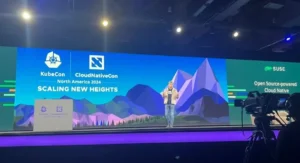KubeSphere evidently failed to realize going in that open source means open, and is changing to a new proprietary license with “open source” in the name.

You can add another name to the list of companies replacing a bone fide open source license with a license that sounds open but is anything but. On Friday, Beijing-based QingCloud Technologies announced that its flagship open source offering is moving to a fauxpen licence. The project is KubeSphere, a popular platform for managing Kubernetes, which until now has been available under Apache License 2.0.
This change marks a significant shift in licensing policy—one that’s become uncomfortably common among cloud infrastructure vendors in recent years. The new license fits the term fauxpen — used to describe restrictive proprietary licenses with open source trappings — in nearly every way, starting with its name: KubeSphere Open Source License. Other than the name, there’s nothing open source about this license.
Although QingCloud is claiming the new license is based on Apache 2, it’s basically proprietary freeware with restrictions that keep it from complying with Open Source Initiative definitions of open source. Like most other fauxpen licenses, it forbids various kinds of commercial use, SaaS offerings, and changes to the product’s branding. These restrictions leave little doubt as to the intent behind the change.
It also becomes effective immediately:
“Effective immediately upon the publication of this announcement, we will suspend the download links for the KubeSphere open-source version and cease providing free technical support.”
As you might imagine, the suddenness of the move has caused frustration among users and contributors who depended on the project’s open availability.
Although the reason for this is probably the same old blah-blah woof-woof we’ve heard from everybody else — from MongoDB to Redis to Elastic to HashiCorp — who evidently mistook open source for a business model instead the software development it’s always been, QingCloud has come up with some double-speak gobbledegook that seems to blame the move on genAI:
“Over the past three years, the rapid rise and development of GenAI have transformed computational paradigms, driving the transition from digitalization to intelligence. As a supporting industry, the infrastructure layer has undergone profound changes, leading to shifts in the supply logic of component technologies and products across the broader IT industry. To adapt to the new era, further enhance product capabilities and service quality, and focus on core technology R&D and the optimization of commercial-grade solutions, after years of planning and careful consideration, the company has decided to make the following adjustments to the KubeSphere open-source project…”
“Say what!”
So, if your business has been relying on the open source and freely supported version of KubeSphere, what’s the next best move? If you were to ask me, I’d tell you to bite the bullet and spend a few bucks migrate to another solution for wrangling kubernetes — there are plenty of them out there.
QingCloud, on the other hand, thinks you should start shoveling money its way:
“If your company is currently using the KubeSphere open-source version … please contact our customer service team promptly to ensure the smooth operation of your business. We will tailor a commercial version solution for you, including dedicated technical support, vulnerability fixes, version upgrades, and other value-added services, to ensure your business systems run stably in an efficient and secure environment.”
In other words, “Nice infrastructure you have there. It’d be a shame if something happened to it.”
Meanwhile, back at the ranch, KubeSphere core code remains covered by Apache 2, so there’s always that.
Christine Hall has been a journalist since 1971. In 2001, she began writing a weekly consumer computer column and started covering Linux and FOSS in 2002 after making the switch to GNU/Linux. Follow her on Twitter: @BrideOfLinux






